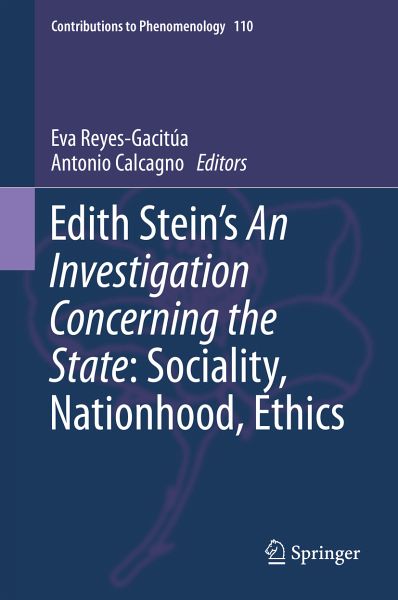
Edith Stein's An Investigation Concerning the State: Sociality, Nationhood, Ethics (eBook, PDF)
Versandkostenfrei!
Sofort per Download lieferbar
72,95 €
inkl. MwSt.
Weitere Ausgaben:

PAYBACK Punkte
36 °P sammeln!
This book explores Edith Stein's phenomenology of the state. It features chapters on the application of Stein's political philosophy to real issues and questions affecting nations today. The contributors also situate Stein's political theory within her larger philosophical corpus.The collection examines An Investigation Concerning the State from various angles. Scholars first consider some of the direct claims Stein makes about social and political ontology. They mine her work for its implications for and applications to contemporary debates. Then, the contributors position her work in relatio...
This book explores Edith Stein's phenomenology of the state. It features chapters on the application of Stein's political philosophy to real issues and questions affecting nations today. The contributors also situate Stein's political theory within her larger philosophical corpus.
The collection examines An Investigation Concerning the State from various angles. Scholars first consider some of the direct claims Stein makes about social and political ontology. They mine her work for its implications for and applications to contemporary debates. Then, the contributors position her work in relation to other figures in phenomenology, including Edmund Husserl and Max Scheler. Finally, Stein's views are brought to bear on other disciplines, including feminism, theology, and literature. The contributors also use her theory of the state to address various contemporary issues, including bioethics and rights, globalization, as well as social and political inequality.
The view of the state that emerges has implications for how we do politics and make ethical decisions. Moreover, Stein's work has an impact on our views of sociality (as opposed to the sociality of contractarian views of the state), pedagogy, women, theories of justice and law, as well as social psychology and religion. This volume helps readers better understand this vital voice in political philosophy and appeals to students, professors, and researchers working in the field.
The collection examines An Investigation Concerning the State from various angles. Scholars first consider some of the direct claims Stein makes about social and political ontology. They mine her work for its implications for and applications to contemporary debates. Then, the contributors position her work in relation to other figures in phenomenology, including Edmund Husserl and Max Scheler. Finally, Stein's views are brought to bear on other disciplines, including feminism, theology, and literature. The contributors also use her theory of the state to address various contemporary issues, including bioethics and rights, globalization, as well as social and political inequality.
The view of the state that emerges has implications for how we do politics and make ethical decisions. Moreover, Stein's work has an impact on our views of sociality (as opposed to the sociality of contractarian views of the state), pedagogy, women, theories of justice and law, as well as social psychology and religion. This volume helps readers better understand this vital voice in political philosophy and appeals to students, professors, and researchers working in the field.
Dieser Download kann aus rechtlichen Gründen nur mit Rechnungsadresse in A, B, BG, CY, CZ, D, DK, EW, E, FIN, F, GR, HR, H, IRL, I, LT, L, LR, M, NL, PL, P, R, S, SLO, SK ausgeliefert werden.












